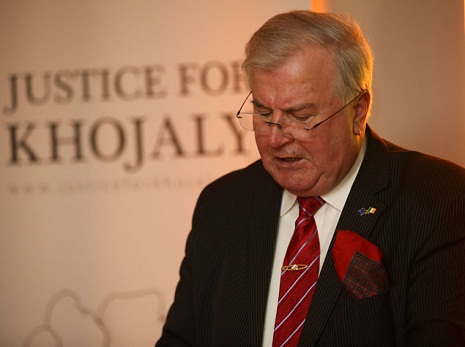The screening commemorated the victims of the Khojaly Massacre in 1992 – the worst single atrocity of the Armenian–Azerbaijani conflict over Nagorno-Karabakh – which claimed the lives of 613 civilian victims in 1992. The death toll included 106 women, 63 children and 70 elderly people. The evening also saw the launch of the landmark publication Khojaly Witness of a War Crime: Armenia in the Dock.
Speaking before the audience of over 80 politicians, councillors, VIPs and representatives from the arts and media spheres, including Professor Farrel Corcoran, Dublin City University and Former Chair of Irish State Broadcaster RTÉ; Ellen Gunning, Presenter, Mediascope; and representatives of the Turkish, Argentinian and Dutch Embassies to Ireland, Leon Cook, Communications and Marketing Director, The European Azerbaijan Society (TEAS), introduced the film. He said: “TEAS is proud to organise these events within the framework of the Justice for Khojaly campaign, which is an international awareness campaign initiated by Mrs Leyla Aliyeva, Vice-President, Heydar Aliyev Foundation. The Justice for Khojaly international campaign was launched on 8 May 2008. The campaign’s rapid development is a measure of international support for the restoration of justice in the region. This support has been expressed at events in over 100 countries in Europe, America, Asia and Africa and, has come from individuals and international organisations, as well as states. TEAS is organising events within the Justice for Khojaly campaign in London, Paris, Strasbourg, Brussels, Berlin, Bern, Istanbul, Ankara, Rome, Luxembourg and Vilnius, in addition to tonight’s screening in Dublin.
“Endless Corridor is a film that came about because Richard Lapaitis, a Lithuanian journalist and witness of the horror of Khojaly, could not let the experience lie or forget the people who survived. He returned with a touching and humane desire to find out how they coped with memories of loved ones killed before their eyes. Russian journalist Victoria Ivleva also returned to reunite with Mehriban, a mother whose two-day-old baby she had saved in the confusion. The stories are of ordinary people whose lives were devastated by the Armenian invasion of their land.”
“This is not a ‘frozen’ conflict, as it is often erroneously dubbed. Across the ‘contact line’ between Azerbaijan and the occupied territories, there is shooting on a daily basis, and the past year saw 72 record deaths, the worst since the ceasefire in 1994.
“Indeed just recently, Armenian occupying forces have captured and tried two Azerbaijanis named Dilham Asgarov and Shahbaz Guliyev, who were seized when visiting their relatives’ graves in the Armenian-occupied region of Kalbajar – which has subsequently been condemned by Federica Mogherini, Vice-President, European Commission and High Representative of the European Union for Foreign Affairs and Security Policy, as an unlawful act, given they are civilians. In December, an illegal ‘court’ sentenced them to 22 years and life, respectively.”
Veteran Irish Senator Terry Leyden (Fianna Fáil) said: “Whilst we gather here in Dublin in the beautiful surroundings of The Light House cinema, a very short distance from the River Liffey, it is worth remembering that in cities across Europe and beyond tonight and around this time, the documentary we are about to see premiered in Dublin will also receive its country premieres before audiences gathered in Ankara, Moscow, Berlin, Paris, Brussels and Prague.
“I want to commend the Lithuanian producer and director, Aleksandras Brokas and the American co-producer Gerald Rafshoon for undertaking the project and bringing the film to the big screen. This was five years in the making and involved film professionals from 15 countries in order to provide an independent point-of-view on the situation in the region.
“Tonight’s documentary is about real events; real lives; real conflicts; and a real tragedy. As a national politician who is, and who has been for many years, actively engaged in dialogue at international level – be that in Brussels, Strasbourg or elsewhere across Europe and beyond – I have come to learn a great deal about Azerbaijan, its people, its issues, and chief amongst all of this, the Armenian–Azerbaijani conflict over Nagorno-Karabakh.”
Leon Cook went on to launch the book Khojaly Witness of a War Crime: Armenia in the Dock. He explained: “It is 23 years since the worst massacre of the Armenian–Azerbaijani conflict over Nagorno-Karabakh. The perpetrators still dispute responsibility for what happened in and around Khojaly on the night of 25¬–26 February 1992.
“This book was published last year to set the record straight, and contains first-hand documented evidence. It includes interviews with witnesses of the events in Khojaly, materials published in the international press, the views of foreign researchers, reports from international organisations, and rare pictures taken by international photographers.”
Despite the passing of four UN Security Council resolutions against the invasion, Armenia continues to occupy Nagorno-Karabakh and seven surrounding districts to this day. Currently nearly 20 per cent of Azerbaijani territory remains occupied, and approximately 875,000 refugees and internally displaced persons (IDPs) remain spread across Azerbaijan. The evening was dedicated to the memory of the Khojaly victims and those Azerbaijanis who have one wish – to return home.
More about:
















































